Does Epsom Salt Kill Bacteria?
Epsom salt can remove bacteria, dirt, and toxins from the body, including those hidden in the corner of your nails.
On Aug 30, 2023 – 12 minutes read
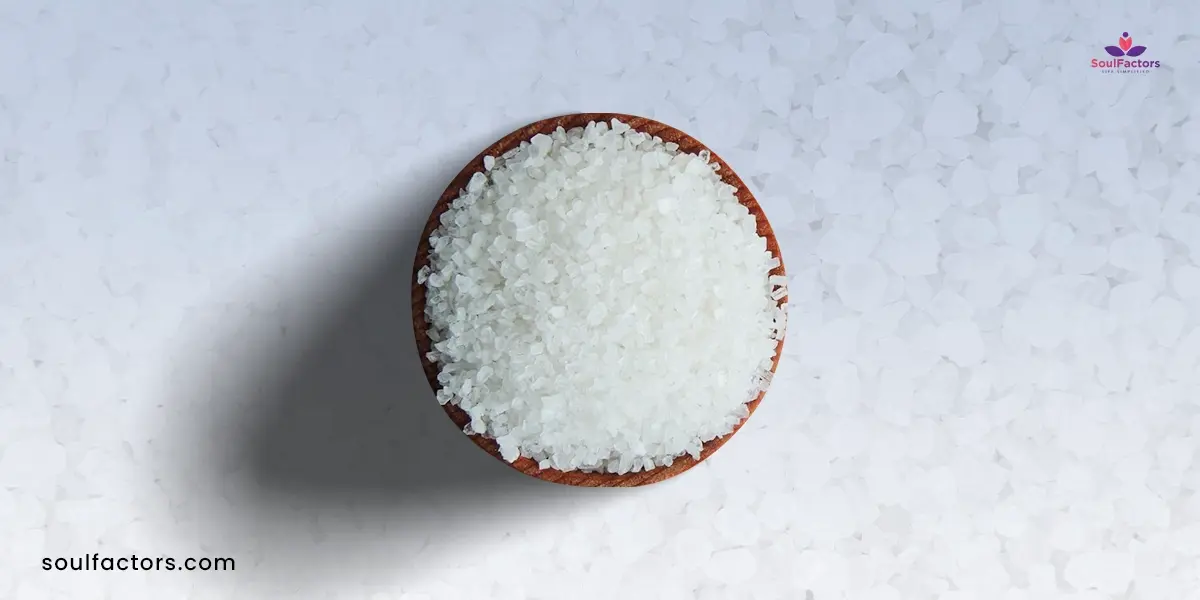
Epsom salt is one of the household items you must have next to your mop, broom, and dishwashing liquid. It is a naturally occurring mineral compound comprising sulfate (sulfur) and magnesium. Since these minerals have incredible biochemical properties and an amazing variety of uses, many people want to know “Does Epsom salt kill bacteria?”
When you hear the term ‘Epsom salt’ or read it on a label, you are instantly reminded of a relaxing bath. While the mineral compound relaxes your body like no other, it can do much more.
Let’s look at how Epsom salt is beneficial in treating different types of infections and examine “Does Epsom salt kill bacteria.”
Can Epsom Salt Get Rid Of Bacteria?
Epsom salt has antimicrobial properties to work against some types of bacteria. It attacks the cell membrane of bacteria to burst them open and release the contents of the bacteria into the surrounding environment. When this happens, it prevents further growth and replication.
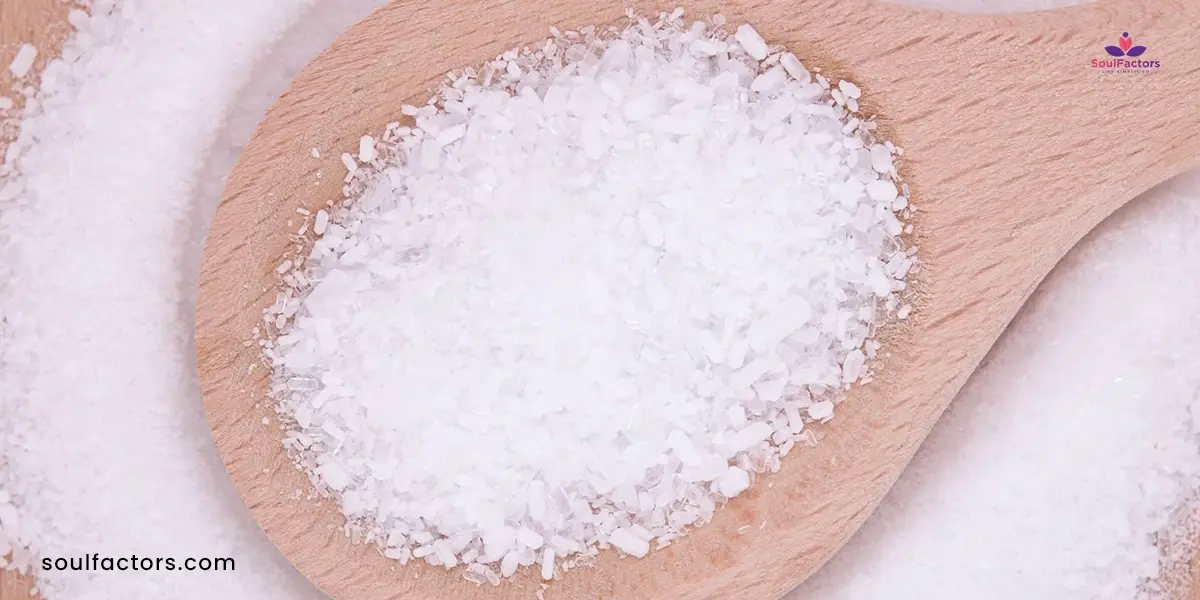
In particular, Epsom salt works wonders on gram-negative bacteria since they have an outer membrane prone to disruption. This process answers the question about “does Epsom salt kill bacteria,” in a gist.
According to studies, Epsom salt has a positive effect on different bacteria, including Escherichia coli, Staphylococcus aureus, and Pseudomonas aeruginosa (1). These bacteria are known to cause infections in the respiratory system, urinary tract, and skin.
Thus, by restricting the growth of bacteria, Epsom salt helps draw out infections and offers many curing benefits.
Does Epsom Salt Kill Fungus?
If your nail color is whitish-yellow or brownish, it is a sign of a toenail fungus infection. The condition can cause pain and discomfort. It can cause immense trouble and impact your daily life by restricting mobility. Moreover, the infection can make your toenails thicker and more brittle.
Fungus grows in a moist and warm environment. Thus, the primary cause of a fungal infection includes a warm, humid climate and excessive sweating due to physical activities. A toenail fungal infection can be avoided by not walking barefoot in damp places like gyms, locker rooms, and showers.
But if you are suffering from the infection, Epsom sea salt soaks can offer relief. The Epsom Salt Council shares that the mineral compound does not kill or eliminate fungus, but it removes excess moisture and makes the environment less favorable for fungus. As mentioned earlier, Epsom salt does kill bacteria to ensure that your feet are clean, and the chance of infection is low.
Moreover, the sea salt softens your skin and draws out the infection. Make sure you consult a healthcare provider for a proper diagnosis of your condition. You may need medications. Generally, it is recommended that you take Epsom salt soaks with medications to boost the effects.
How To Do An Epsom Salt Soak to Kill Bacteria
- Take a bowl with enough water to cover your feet.
- Add a cup of Epsom salt and two cups of white vinegar.
- Dip your feet for at least 10 to 20 minutes.
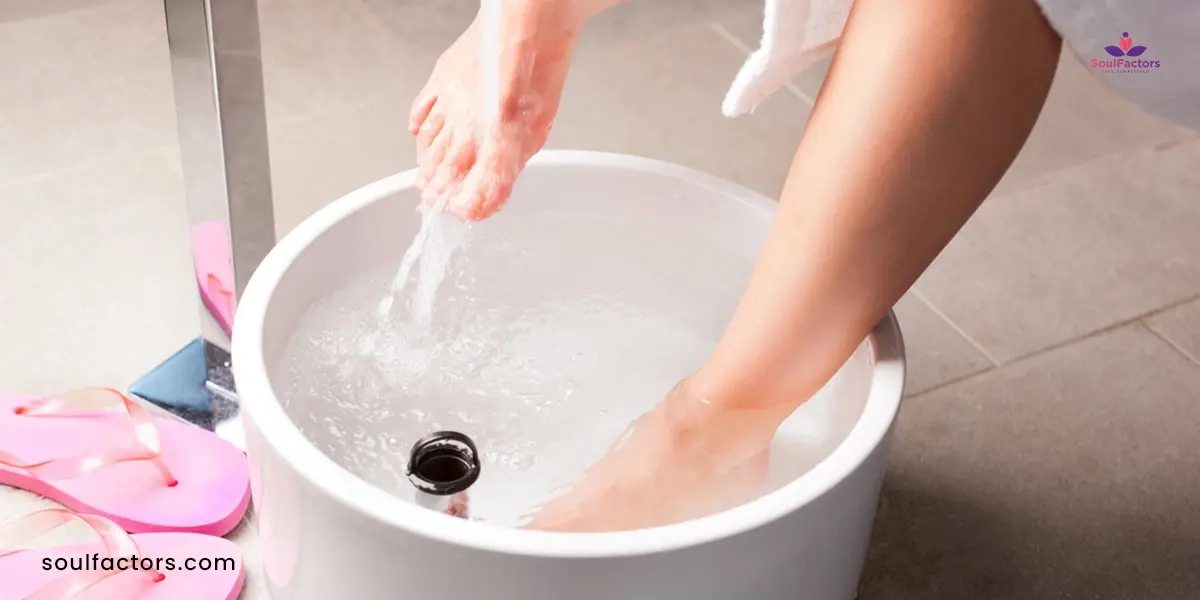
The sulfur in Epsom salt is said to have powerful antifungal properties. It treats the bacteria and fungus in your feet. Make it a routine to soak your feet in Epsom salt at least two times a week to keep infections and odor at bay. Practice more diligently during the monsoon season.
Does Epsom Salt Heal Wounds?
Open wounds require proper care to avoid infections and promote healing. Many people resort to soaking the afflicted area in an Epsom salt solution. This is because the remedy offers many benefits. The mineral compound possesses natural anti-inflammatory properties, which help to reduce swelling and pain.
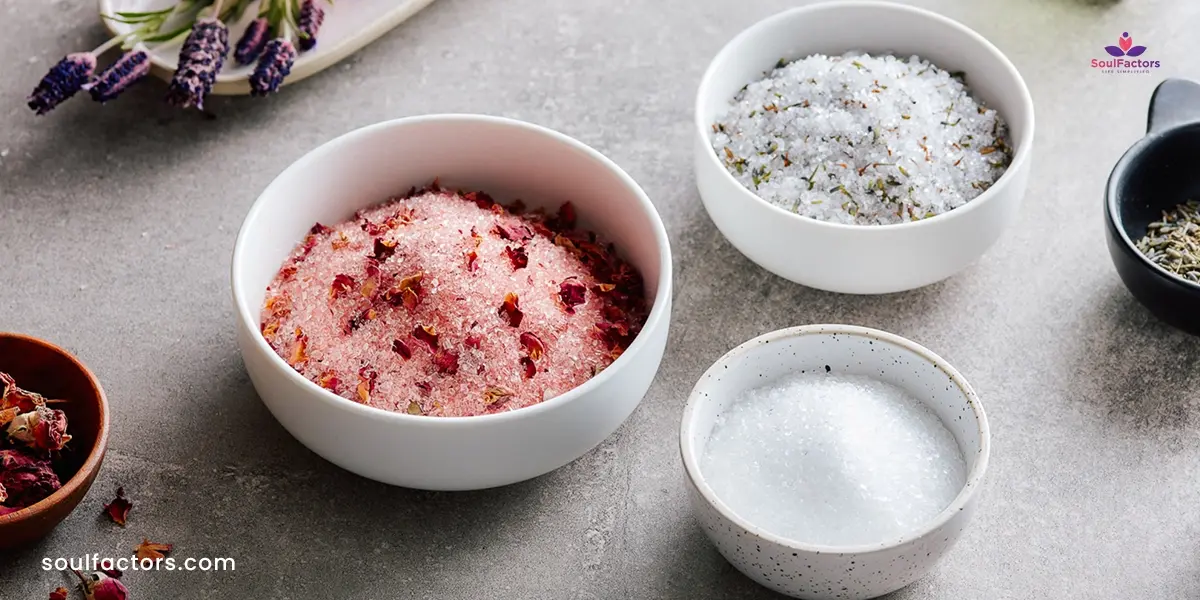
As mentioned earlier, the answer to “Does Epsom salt kill bacteria,” is a yes. Thus, when its salt content eliminates bacteria and impurities, the wound does not get infected further. The presence of magnesium sulfate improves blood circulation, which can speed up the healing process.
Additionally, soaking your wound in Epsom salt lowers scar visibility. It makes the skin softer and removes dead tissue easily.
Is Epsom Salt Good For Swollen Feet?
Indeed. Your feet can immensely benefit from Epsom salt baths, especially when there’s swelling due to fluid retention, minor inflammation, or poor circulation.
Epsom salt, comprising magnesium and sulfate, has the properties to reduce swelling and offer relief. Magnesium promotes healthy circulation. It helps to relax blood vessels and improve blood flow (2). Consequently, it can reduce fluid build-up and swelling in the feet.
In addition, sulfate, the main component of Epsom salt, is said to have mild anti-inflammatory properties. By soaking your feet in an Epsom salt bath, you can ease minor inflammation that contributes to swelling.
Swollen feet are often accompanied by muscle tension and discomfort. An Epsom salt bath or a foot soak helps to relax your foot muscles, which can alleviate tension and lead to reduced swelling.
However, you must know that this relief is temporary and works only in the case of mildly swollen feet. If the cause of swelling is an underlying medical condition or a severe injury, you might not experience any benefits.
Moreover, you must note that Epsom salt baths are not the ideal remedy for people with medical conditions like diabetes, kidney concerns, or open wounds on the feet. A healthcare professional must be consulted before trying Epsom salt baths.
Also, if the swelling is severe or consistent, or you experience any other symptoms like redness, warmth, or pain, you must seek medical attention to ensure there are no underlying health concerns.
Is Epsom Salt Good For Skin Infections?
The use of Epsom salt or magnesium sulfate is common in skin care and therapeutic practices. The mineral compound does not directly treat skin infections, but salt baths or compresses can provide relief and aid the healing process.

The different skin infections that can benefit from the use of Epsom salt include:
Minor Skin Irritations:
If you suffer from minor skin irritations like mild redness or itching, an Epsom salt bath can offer soothing effects. The magnesium in Epsom salt helps your muscles relax and ease discomfort. The sulfate aids the body’s natural anti-inflammatory responses.
Epsom Salt Kills Bacteria in Mild Wounds Or Abrasions:
Epsom salt dissolved in warm water helps to clean mild wounds. The solution keeps the area clean and prevents further infection. But make sure you only use saline solution or clean water for wound cleaning.
Boils Or Abscesses:
With an Epsom salt compress, you can expect to drain the pus from small boils or abscesses. Warm water and the osmotic effect of salt can together extract some of the fluid, providing relief and aiding the healing process.
Athlete’s Foot:
Epsom salt foot soaks also offer relief for conditions like athlete’s foot and toenail fungal infections. When you dissolve Epsom salt in warm water, the salt’s antifungal properties and the water’s warmth help reduce itching and discomfort associated with the condition.
Minor Skin Inflammation:
Epsom salt baths have benefitted some people in managing inflammation. They help you feel at ease by reducing the discomfort caused by psoriasis and eczema. However, everyone’s skin condition is different, and you must observe how your skin is responding. If you feel any itching, redness, or dryness, you must not take Epsom salt baths without consulting a healthcare professional.
Epsom salt is good for skin infections in different ways. But you must exercise caution while using it. Do not use it on open or broken skin, as it can lead to irritation or stinging. Additionally, if you suffer from any health conditions or are prescribed medications, check with your healthcare provider before taking an Epsom salt bath for skin concerns.
What Kind Of Toxins Does Epsom Salt Remove?
Epsom salt is believed to boost the removal of toxins from the body, especially with its use in baths and topical applications. But, you must know that there is limited and unrecognized scientific evidence regarding the kind of toxins Epsom salt can remove. Most of the claims around its detoxification capability rely on traditional practices and anecdotal evidence.
Epsom salt constitutes magnesium and sulfate, which are believed to have potential detoxification effects. Magnesium is responsible for over 300 enzymatic reactions in the body, including those required for detoxification. The second component, sulfate, aids the production of glutathione in the body, which helps neutralize and eliminate toxins (3). Thus, Epsom salt supporters claim that the presence of these two elements makes the mineral capable of removing toxins.
One type of toxins Epsom salt baths remove include heavy metals. These heavy metals include lead, mercury, and arsenic. They accumulate in the body over time and contribute to many health concerns. Proponents argue that Epsom salt helps in removing these heavy metals through the skin’s pores, thereby lowering the burden on the body’s detoxification organs.
Additionally, Epsom salt baths can help in the elimination of other waste products, including environmental pollutants and metabolic byproducts. The lukewarm water in the soak bath opens the skin’s pores, aiding in better sweating and waste elimination.
To conclude, Epsom salt constitutes magnesium and sulfate, which promote the detoxification process by relaxing muscles, enhancing circulation, and assisting the body’s natural detox mechanisms.
How Can You Use It? – Epsom Salt Kill Bacteria
The two ways to use Epsom salt are:

1. Epsom Salt Bath
You can purchase Epsom salt online or from pharmacies and health food stores. Some Epsom salt products contain essential oils and nourishing ingredients to give you a more enriched experience. Follow the steps mentioned below to reap the uncountable benefits of an Epsom salt bath:
- Take two cups of Epsom salt and pour them into a standard-sized bathtub when the water is filling. This fastens the process of dissolving and reduces the amount of time you need to wait before entering the tub.
- Keep the temperature optimum, neither too hot nor too cold. Anywhere between 33 to 37 degrees Celsius is ideal.
- Relax in the water for around 15 to 20 minutes. If you desire, you can stay for longer.
- Don’t use soap, as it can hamper the effects of the salt.
- Avoid indulging in any physical activity for at least two hours after the bath. The recommended time to take an Epsom salt bath is before getting into bed.
2. Epsom Salt Foot Soak
Feet pain or soreness is common after a long day. After all, your feet bear the brunt of all the physical activities you undertake throughout the day. Soaking your feet in Epsom salt water is a good way to pamper them when they feel tired and weary. Epsom salt is also a good choice during the foot-soaking step for at-home pedicures.
- Put half a cup of Epsom salt into a tub with lukewarm water. After it dissolves, soak your feet in it for a minimum of 20 minutes.
- Make sure the chair you sit in is relaxing. Play your favourite music or read an interesting book to stay entertained.
- You can use a pumice stone after the soak to remove any dead skin.
- Wipe your feet with a clean towel.
- Massage your feet with a foot cream or body lotion. You can mix a few drops of essential oil to elevate the relaxing experience.
- Do not step out or walk too much after this for best results.
Precautions – Does Epsom Salt Kill Bacteria?
If you want to enjoy the many benefits of Epsom salt, make sure you buy the salt and foot soak suitable for human use. Epsom salt naturally contains magnesium sulfate, but many products are manufactured for different purposes. The chemical composition of the salt is the same, but its grades differ. Thus, before you buy an Epsom salt product, read its USP on the label. The USP confirms that the product has been tested for human use by scientists and it meets the safety guidelines laid down by respective authorities. You can buy Epsom salt for foot soaks from pharmacies, online, or health food stores.
Most people can take an Epsom bath or foot soak safely. However, in some cases, you must consult a healthcare provider. For instance, people with very dry skin must avoid doing foot soaks excessively because the salt can make the skin dry, leaving it more susceptible to cracks.
Any type of foot soak is not suitable for diabetic patients because of the increased risk of infection. When you soak your feet regularly, it can increase dryness, thereby resulting in cracked skin and an increased chance of infection. Moreover, if you have open sores or wounds, make sure you discuss them with an expert before using Epsom salt for a foot soak.
While Epsom salt foot soaks have many benefits, they cannot help with certain foot problems. You must ask a healthcare provider for advice if you experience any of the following symptoms:
- redness or swelling of the foot
- foot pain lasting a week
- prolonged tenderness post a foot injury
- open sores
Conclusion
Epsom salt has innumerable uses and benefits. Due to the presence of magnesium ions, it can ease the body and relieve stress. Moreover, it provides relief from bruises, wounds, strained muscles, and foot aches. The component can get rid of splinters, treat toenail fungus, strengthen hair and boost hair volume, fight inflammation, and act as an exfoliating agent.
Many people question, “Does Epsom salt kill bacteria?” You must know that it possesses antimicrobial properties to fight against certain kinds of bacteria. It disrupts the bacteria’s cell membrane, making them lyse or burst open. Epsom salt also has anti-inflammatory and exfoliating benefits for the skin.
FAQ
Epsom salt contains sulfur, which is a powerful bacteria-fighting chemical. It is effective against a variety of bacteria, including Escherichia coli, Pseudomonas aeruginosa, and Staphylococcus aureus.
Soaking your feet in Epsom salt can help you clean, sanitize, and pamper your feet better than your shower or tub bath. The minerals in Epsom salt and the soak together can clean your feet rigorously, removing all germs and substances you may not see with the naked eye.
Epsom salt can detoxify the body internally and externally. It comprises oxygen, sulfate, and magnesium, and these ingredients have been proven to stimulate detoxification pathways in the body.
Epsom salt is well known for its laxative effect. When dissolved in water, it can facilitate intestinal mobility and aid in the elimination of harmful toxins from the intestine. Adding half a lemon to the mixture can speed up the process since lemon juice increases bile production and hence keeps the gut clean.

Subscribe to Newsletter
Elevate your routine, stay on trend, and embrace a personalized beauty journey with our curated insights.



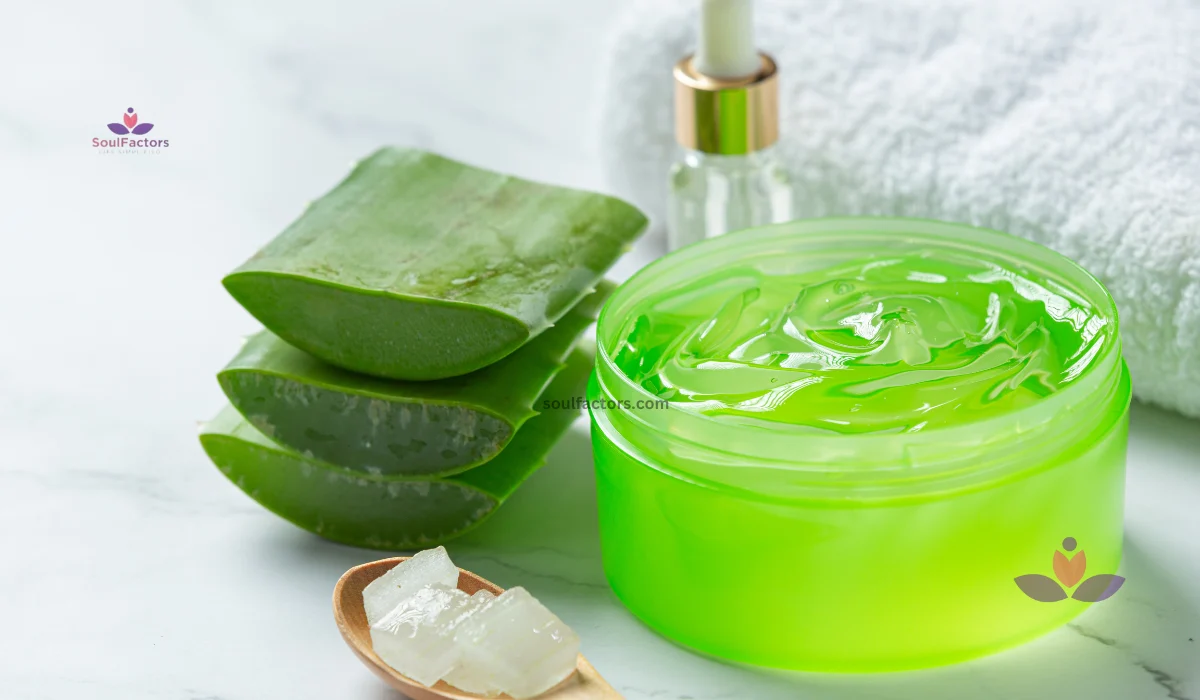

Write a Comment